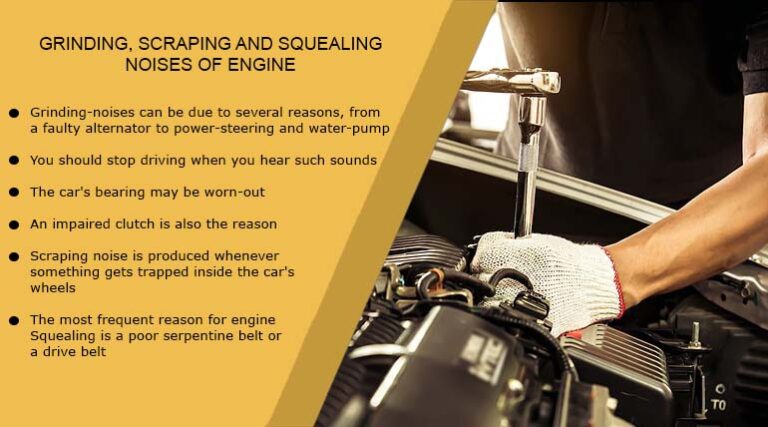All About Knocking of Engine And Ways To Reduce It
Ever heard knocking, constant tapping, or a scraping-like noise from your vehicle’s engine? Never ignore this. In this article, we will discuss all knocking of engine, its possible causes and how to resolve this issue in detail. So that you can protect your car’s engine from severe damage.
Knocking Of Engine: What Does It Mean?
Knocking takes place when the air/fuel mixture’s combustion inside the engine doesn’t occur as a consequence of flame-front propagation. The ignition of the flame-front is via a spark-plug.
Instead of this, the explosion of air/fuel blends pockets occurs outside the regular combustion front’s envelope. As a result, the engine starts producing knocking, constant tapping, or scraping-like noises. This is called as Knocking of the engine. An uneven burning of fuel also leads to knocking.
Causes Of Knocking Of Engine
The primary reason is putting a lower than 87 octane-rated gasoline in the vehicle tank, leading to knocking off the engine. Engine’s knocking resultantly affects the functionality and economy of the engine. Gasoline will burn hastily if one puts a lower-octane gas in a machine with higher compression. It causes an unsmooth burn and the engine’s knock. Hence, using the correct gasoline fuel with the proper octane grading is crucial.
Other reasons include the following;
- Poor knock-sensor
- A damaged crank-shaft
- Inaccurate spark-plug
- Cylinder head not lubricated properly
Ways To Reduce Knocking Of Engine
To diminish the knocking-like-noise from your vehicle, do this;
- Never put less than 87 octane-graded gasoline.
- Always utilize the right octane-fuel.
- Using an accurate type of spark-plug for the engine reduces knocking. Hence, make sure of it.
Question and Answer Section!
How To Opt For An Accurate Fuel For My Car’s Engine To Avoid Engine Knocking?
It is advisable to always select a fuel type according to the kind of vehicle’s engine. Hence use gasoline for gasoline-based engines. Whereas opting for a diesel-fuel for the diesel-based machine. Moreover, use regular unleaded gasoline of at least 87 or higher to avoid engine knocking. One can also take mid-grade or premium gas, if suggested by the manufacturer’s manual.
“Do not lower than regular unleaded 87 Octane-graded gasoline. Use diesel fuel in a gasoline-based engine and gasoline fuel in a diesel-based engine!”
Which Gasoline Type Is The Finest For My Car (Gasoline Engine)?
If the owner’s manual of your vehicle suggests using regular gasoline, select regular unleaded 87-octane-graded gasoline.
It is comparatively less expensive than the premium gasoline (91 to 93 Octane) and mid-grade (89 to 90 Octane) gasoline in the market. Moreover, utilize premium gasoline if advocated by the owner manual. To avoid knocking of engine, use a minimum 87 or greater octane-rated gasoline.
Which Diesel Type Is The Finest For My Car (Diesel Engine)?
Diesel fuels available for heavy-duty and high-speed vehicles are two;
- Ultra-Low Sulfur Diesel grade No.1 (No.1D)
- Ultra-Low Sulfur Diesel grade No.2 (No.2D)
For higher speeds and heavy-duty diesel engines, use a No.1D diesel. It is also used in diesel vehicles in constant cold (winter) weather. It is used for particular purposes.
Whereas using No.2D diesel fuel for the diesel engine running in moderate to warm climates and for high-loads and high-speed vehicles. Usually, trucks and fleets utilize this kind of diesel fuel.
What Is The Cost Of Fixing the Knocking Of Engine?
The expense of resolving the knocking of the engine depends upon the root cause and the location of the problem. The repair will cost $100 to $400 if the knocking is due to a poor knock-sensor. However, the repair would cost almost $2000 if the damage is very severe. This can also include replacing the rod of the cylinder.
Is It Possible To Continue Driving A Vehicle Creating A Knocking Noise?
It is not suggested to drive a vehicle from which a knocking noise is produced. This is due to some internal problem. Repairing such a vehicle would be really difficult if it continued driving despite knocking of its engine. It will also be very costly for you if the problems because so severe that it requires a replacement.
What Is Meant By “Deposition Of Carbon”?
As we know, the burning of fuel occurs inside the engine. Resultantly, it leaves a carbon-blackish residue. This is called Carbon’s deposit or deposition of Carbon. These deposits further clog the cylinders. This is one of the reasons for knocking off the engine.
Conclusion
To conclude, putting a lower than 87 octane-rated gasoline in one’s vehicle tank causes the engine’s knocking. . Engine’s knocking resultantly affects the functionality and economy of the engine. Gasoline will burn ahead of time. If one puts a lower-octane gas in a machine with higher compression. It causes an unsmooth burn and engine knock.
If you hear a fainted-knocking sound from your vehicle, it indicates no danger. But if you hear a harsh knocking, it is due to the utilization of a lower quality and lower octane gasoline. Using gasoline with higher octane-grading is very important.
Fill up the vehicle’s tank with a commended minimum of 87-octane-rated gasoline or mid-graded 91-octane gasoline.





